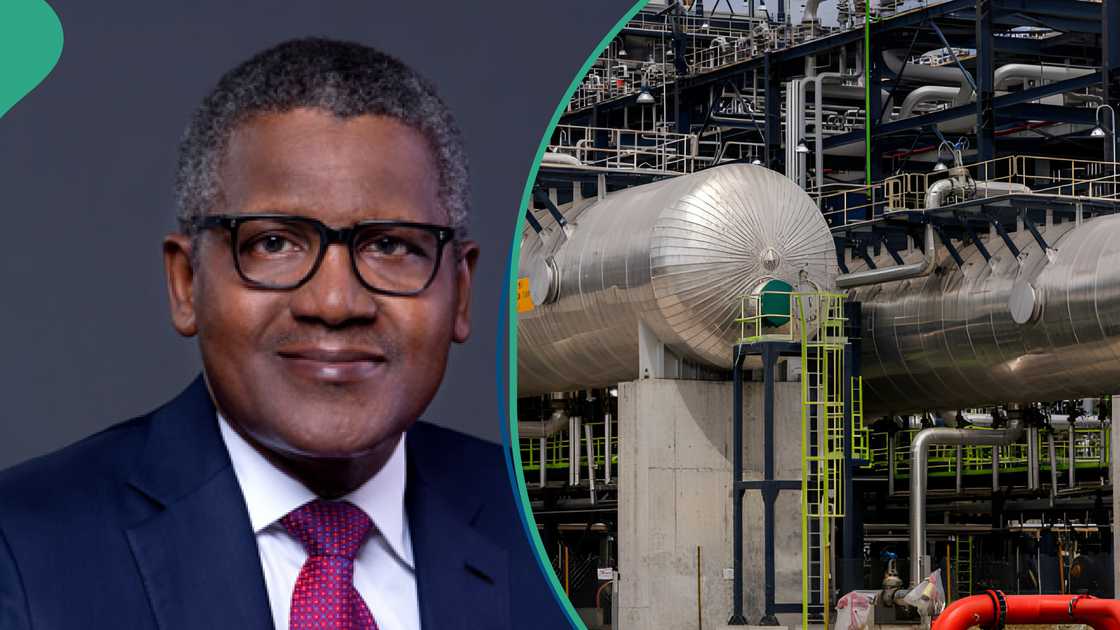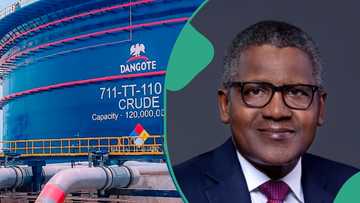Dangote Refinery Imports Ghanaian Crude as Output Hits 450,000 bpd
- The Dangote Refinery has imported Ghanaian crude for the first time since it commenced operations
- $20 billion refinery imported Ghana’s Sankofa crude, a medium-sweet grade, into its processing mix
- The development comes as the refinery is facing output concerns amid exports to the Middle East and Europe
Legit.ng’s Pascal Oparada has reported on tech, energy, stocks, investment and the economy for over a decade.
For the first time since operations began, Dangote Refinery has imported Ghana’s Sankofa crude, a medium-sweet grade, into its processing mix.
Data from global market intelligence firm Kpler shows that in August, the facility received five Nigerian Suezmaxes, two U.S. Very Large Crude Carriers, and one shipment from Ghana.

Source: UGC
Refinery output rises but below expectations
The inclusion of Ghanaian barrels highlights a deliberate shift toward supply diversification.
In addition, Brass River crude, which had been absent from Dangote’s feedstock slate for nearly a year, made a comeback.
Analysts say the strategy underlines the company’s determination to move beyond dependence on Nigeria’s and America’s light sweet crude grades.
Kpler estimates that the refinery is now processing about 450,000 barrels per day (bpd), roughly 70% of its nameplate capacity.
This marks an improvement from 400,000 bpd (60%) earlier in the year but remains short of expectations for Africa’s largest refinery.
RFCC maintenance sparks debate
The facility’s gradual ramp-up is being closely watched across the energy sector, given its potential to transform Nigeria from a net fuel importer into a major exporter.
However, the refinery’s performance has been tempered by reports of maintenance-related slowdowns.
According to Kpler, crude intake dropped in August following ongoing maintenance at the Residue Fluid Catalytic Cracking Unit (RFCCU). This unit is critical for gasoline production.
Reports indicated output constraints, but Dangote Industries strongly denied suggestions of operational difficulties.
Anthony Chiejina, Group Chief Branding and Communications Officer, dismissed such claims as “speculative,” stressing that operations remain on track. He did not confirm whether Ghanaian crude was part of the mix.
Earlier, an executive had told S&P Global Platts that RFCC work was completed and output would normalise by late August.
Other sources, however, suggested a full restart may not happen until early September.
Impact on fuel supply
The refinery’s temporary slowdown triggered a rise in gasoline imports into West Africa.
In the past 30 days, nearly one million tonnes of gasoline were shipped from Northwest Europe and the Mediterranean, with about 65% landing in Lomé, Togo.

Source: UGC
The development highlights the region’s heavy reliance on external supplies, even as Dangote positions itself as a long-term game changer.
Competition on the horizon
Adding to the pressure, Cameroon’s Sonara has announced plans to restart its fire-damaged Limbe Refinery by 2027.
If successful, this would introduce a new competitor for Dangote in the West and Central African downstream markets.
Despite these hurdles, Dangote’s diversification and steady production growth reinforce its pivotal role in reshaping fuel supply dynamics across the region.
Dangote increases fuel exports
Meanwhile, the mega refinery ramped up exports to the Middle East and Europe amid refinery shutdowns.
It increased exports of petrol, diesel, and aviation fuel to foreign markets as refinery shutdowns in the Middle East and Europe squeezed supply.
Located in Lekki, Lagos, the $20 billion mega-plant exported significant fuel volumes in August 2025, according to refinery officials.
Dangote Refinery to meet Nigeria’s daily petrol consumption
Legit.ng earlier reported that Dangote Group has announced that its refinery is now producing 57 million litres of Premium Motor Spirit (PMS), commonly known as petrol, daily.
This was disclosed during a recent tour of the refinery complex by a delegation from Zambia, led by the country’s Minister of Energy, Makozo Chikote, and also Aliko Dangote President of Dangote Industries Limited (DIL) to explore a partnership.
After the tour, Dangote stated that the Dangote Petroleum Refinery has enough petrol in storage to meet Nigeria's domestic demand.
Source: Legit.ng





